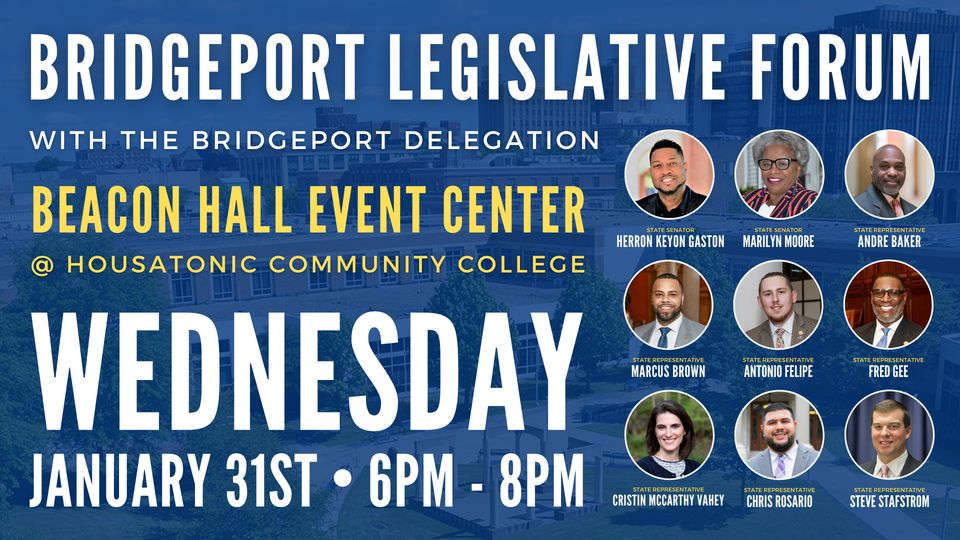
Bridgeport’s nine-member state legislative delegation will attend a forum on Wednesday, 6 to 8 p.m. at Housatonic Community College’s Beacon Hall in advance of the opening of the General Assembly session.
As Bridgeport’s extended mayoral cycle drifts into 2024, this is also an election year for the state legislature during a presidential vote.
0


CONCORD, Vt. — After a trip that seemed it would never end, the red Honda CRV pulled into the gravel driveway of a modest farmhouse here in northern Vermont.
Lynda Bluestein’s husband, Paul, parked and hurried out of the driver’s seat to help his wife, grimacing in pain in the back seat, her lap covered by a gray blanket that matched the sky.
They had left their home in Connecticut four and a half hours earlier that morning, Jan. 3. Paul knew the trip would be grueling for Lynda and had driven hard and fast, glancing often in the rearview mirror at her sallow face, gauging her pain. Paul had given her a dose of morphine before leaving, and she slept much of the way. They had to pull over and stop a few times because Lynda got carsick.
A man emerged from the farmhouse and placed a seat cushion on the frozen ground for her bare, swollen feet and helped her into a wheelchair. Paul took the handles of the chair and gently rolled her toward the farmhouse, the place she had carefully selected to end her life.
She would have preferred to die at her home of more than 20 years in Bridgeport, surrounded by the memories she forged with her husband, her two children, and two grandchildren. Lynda had lingered there, in her house near the ocean, reluctant to leave, even as her condition rapidly deteriorated.
But her most urgent wish, the one she had argued and fought for, was to decide for herself when and how she died.
She believed it is a right anyone with a terminal illness should have, akin in importance to a woman’s right to choose whether to end a pregnancy. But medical aid in dying is illegal in her state, as it is in Massachusetts and all but 10 states across the country. In the three years since doctors diagnosed her with terminal ovarian cancer, she had waged a campaign to call public attention to the issue and excoriate policy makers she saw as squeamish about death.
She gave countless interviews and, hoping her story would change policy in Connecticut and elsewhere, allowed a documentary film crew and two Boston Globe journalists to chronicle the last months of her life. She was the face behind a 2022 lawsuit arguing that a Vermont law allowing medical aid in dying only for state residents violated the US Constitution. She prevailed, and the state last spring granted her permission to die there legally.
Two months later, lawmakers went even further, extending the right to all terminally ill patients who wished to end life on their own terms. The change made Vermont the only state besides Oregon to allow medical aid in dying for nonresidents. It was celebrated by proponents as a landmark victory, one that might even persuade other states to shift.
Lynda Shannon Bluestein and her husband supported the concept of medical aid in dying long before cancer struck her. They attended a Unitarian church, and, unlike many religions that oppose the concept, the Unitarians were a driving force to pass a bill in Oregon, the first state to legalize medical aid in dying in 1997.
Indeed, Lynda had been advocating for causes that bucked convention most of her life, a fact that may have grown out of the independent streak that made her question most everything around her. During her childhood years on a Texas cattle ranch in the empty rangeland south of San Antonio, she couldn’t accept the prevailing fundamentalist Christian beliefs that her mother held.
She discovered in herself a passion for social activism and an impulse to right things she believed to be wrong. After her family moved from rural Texas to the sprawling city of Anaheim near Los Angeles, she went to college, volunteered to work with poor people in Appalachia, and as a nurse dove into a movement in California advocating that women have more control over the deliveries of their babies. She endured physical and verbal abuse while escorting women seeking abortions at clinics stalked by hostile opponents of abortion. Years later, she got a vanity license plate: ACTVST.
Paul Bluestein was an obstetrics and gynecological doctor in Orange County. When Lynda first met him, she immediately began lobbying him to start allowing fathers into the delivery rooms where their children were born — a radical notion in those days. “She was a force of nature,” Paul recalled of that meeting. He yielded to her demand, and his practice became the first in Orange County to do so.
Jimfox, does all this means you’re gonna take your meds daily and on time?
The passing of Lynda Shannon Bluestein, whose last days recently have been shared with respect by Jim Fox, is notable. Her last fight, for the right to respond to the facts of her physidal life actively, while she could to change the rules to permit her to orchestrate her last days, was epic.
Jim Fox is a good reporter of fact and opinion. And the local gathering of State Legislators is a reason to honor her life and memory that may be better known in MA or VT than in her own city of residence. I was happy to enjoy a performance at the Klein recently and to see the vitality and passion for people into the future of this loving woman. May she rest without pain and suffering and let her activism and public record do the necessary work of advocacy in the future. Time will tell.